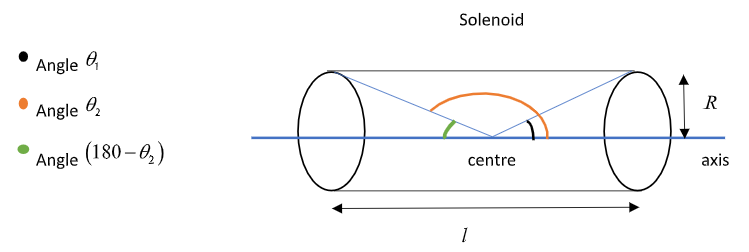Question
Question: A single layered coil (solenoid) has a length \(l\) and cross-sectional radius \(R\) . The number of...
A single layered coil (solenoid) has a length l and cross-sectional radius R . The number of turns per unit length is equal to n. The magnetic induction at the centre of the coil where current I flows through it is given by, B=1+(l2R2)xμ0nI. Find x.
Solution
The general expression for the magnetic induction B at the centre of a solenoid of length l through which a current I flows is given as, B=2μ0nI[cosθ1−cosθ2] . The number of turns per unit length is equal to n . The relation provided in the question is a simplified version of this general expression.
Complete step by step solution:
Step 1: Sketch a rough diagram representing the parameters of the solenoid and list the data given in the question.

Given, the length of the solenoid is l and its radius is R.
The number of turns per unit length is denoted by n.
The current I flowing through the solenoid leads to a magnetic induction of B=1+(l2R)2xμ0nI at the centre of the coil.
Also, μ0 is the permeability of free space.
Step 2: Simplify the general expression for B.
Now we know that the magnetic induction at the centre of a solenoid is given by the equation, B=2μ0nI[cosθ1−cosθ2] .
We know, cosθ=hypotenuseadjacent side , and from the figure the adjacent side is 2l and hypotenuse is R2+(2l)2 .
Thus, cosθ1=R2+(2l)2(2l) .
We know, cos(180−θ2)=−cosθ2 and from the figure, we have cos(180−θ2)=R2+(2l)2(2l) or cosθ2=−R2+(2l)2(2l) .
Substituting for cosθ1 and cosθ2 in the equation for B and simplifying we get,
B=μ0nIR2+(2l)2(2l)
Step 3: Equate the general equation and the equation for the magnetic induction given in the question to solve for x.
From the question, we have B=1+(l2R)2xμ0nI at the centre of the coil.
The general equation is B=μ0nIR2+(2l)2(2l) .
Equating both equations, we get 1+(l2R)2xμ0nI=μ0nIR2+(2l)2(2l) .
Cancel out the similar terms to get, 1+(l2R)2x=R2+(2l)2(2l).
Rearranging to obtain, x=R2+(2l)2(2l)1+(l2R)2 .
Now, we take l24 out of the square root, then x=R2+4l2(2l)×(l2)4l2+R2 .
We now can cancel similar terms to simplify the expression.
Therefore, x=1 .
Additional information:
The solenoid is used to generate magnetic fields. This is done by allowing current to pass through it. The arrangement of two solenoids kept at some distance from each other and placed in an evacuated chamber can act as a magnetic bottle. The solenoids will act as a mirror or reflector to the approaching charged particles.
Note:
A change in the electric field induces a magnetic field. This concept is the working principle of the solenoid. Thus, whenever a magnetic field has to be generated in a body, the current is allowed to pass through it. Simplifications of the expressions must be done carefully.
